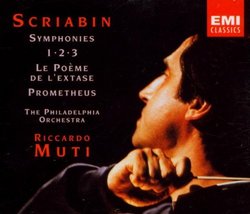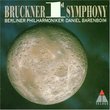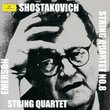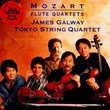| All Artists: Scriabin, Muti, Phl Title: Symphonies 1-3 / Poeme De L'Extase Members Wishing: 0 Total Copies: 0 Label: Angel Records Release Date: 7/5/1991 Genre: Classical Styles: Historical Periods, Early Music, Modern, 20th, & 21st Century, Symphonies Number of Discs: 3 SwapaCD Credits: 3 UPC: 077775425123 |
Search - Scriabin, Muti, Phl :: Symphonies 1-3 / Poeme De L'Extase
 | Scriabin, Muti, Phl Symphonies 1-3 / Poeme De L'Extase Genre: Classical
|
Larger Image |
CD DetailsSimilar CDs
Similarly Requested CDs
|
CD ReviewsA Superb Scriabin Set D. A Wend | Buffalo Grove, IL USA | 01/15/2008 (5 out of 5 stars) "I can recall the Melodiya LP recordings that I had of Alexander Scriabin's orchestral music and the bad sound. In particular I can recall a recording of the Poem of Ecstasy that concluded with more rumbling from the percussion than music from the orchestra. When this set of Scriabin's music appeared with nothing less than The Philadelphia Orchestra and Ricardo Muti it was a revelation. Over the years I don't think this set has been surpassed. The First Symphony, in six movements, from 1900 has a great reading and the chorus and soloists are wonderful. The Second Symphony from 1901 is in five movements and has a lot of individuality with the composer pushing ever forward with tone color. It is the Le divin Poeme (1904 - 08) that Scriabin begins to put into practice his ideas of a fusion of the arts. The music is described in a long poem of the liberation of the human spirit that the composer dictated to his then mistress (later his wife) Tatyana Schloezer and is in three sections: Struggles, Pleasures and Divine Play. Scriabin continued to refine his philosophy and in his next symphony. Le Poeme de l'extase, explored the idea of the joy of creative activity. The Fourth Symphony (composed from 1905 - 08) is cast in a single movement that grows in intoxication. Like the Le divin Poem, The Poem of Ecstasy has its own literary poem that is the foundation of the music. Scriabin's final orchestral work, Prometheus: The Poem of Fire (1910), was conceived as a visual and aural work with the inclusion of a keyboard instrument that could project colors. The work also marked the composer's culmination of his thoughts on art and religion. The famous Prometheus chord that begins the work places us in Scriabin's mystical world. Prometheus also has an important piano part and a wordless chorus that adds to the other-worldly aspects of the music. If looking for an excellent introduction to Scriabin's sound world there are no better performances these Muti recordings. The Philadelphia play marvelously and the sound is absolutely clear. " THE set of Scriabin's orchestral works. Scriabinmahler | 03/27/1999 (5 out of 5 stars) "If you like Sciabin, you REALLY like Scriabin. You can't like a piece by Sciabin without loving it and wanting more. He is much like a Lays potato chip in this regard. This is the place to get all of the major ochestral works in one place. The "Poem of Ecstasy" is not subtle. Scriabin was the early version of The Artist Formerly Known as Prince. Scriabin might have come up with his own version of MTV if he had lived long enough. If you can momentarily put aside the pure eroticism, you will also notice that the "Poem of Ecstasy" is an incredibly colorful piece of music. Winds, brass, strings, and percussion weave their magic for 20 wonderful minutes. The Symphony #3 "The Divine Poem" is no less exciting. Muti is known as a brass man, and it takes some serious brass to do justice to Scriabin. It is difficult not to enjoy this romp with the Philadelphia Orchestra.If you like Scriabin's themes you are in luck, because they re-appear often. If you like the orchestral works, don't stop there! There is a whole world of piano music to explore. Get involved in the Scriabin renaissance!" Towerling Performances! Scriabinmahler | UK | 12/09/2007 (5 out of 5 stars) "
These towerling performance of Scriabin's orchestral masterpieces remains as one of the greatest achievements by Muti and Philadelphia Orchestra. Especailly the third Symphony and Poem of Ecstasy surpass all existing recordings for its gorgeous sound, masterful timing of silence at crucial moments, gigantic finale and incandescent build-up to each climax. Only Pletnev's account of the Ecstasy can rival the grandeur. Ashkenazy's polite accounts do not come even close. Other symphonies are equally outstanding too. The first symphony is hugely under-rated masterpiece, full of inspired melodies and superb vocal parts. What a shame Scriabin did not write more for voice! Rich Philadelphia sound is beautifully recorded with warmth and amazing dynamic range." |

 Track Listings (6) - Disc #1
Track Listings (6) - Disc #1










